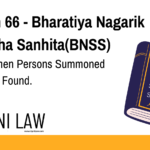Code: Section 66 BNSS
Where the person summoned cannot, by the exercise of due diligence, be found,
the summons may be served by leaving one of the duplicates for him with some adult
member of his family residing with him, and the person with whom the summons is so left
shall, if so required by the serving officer, sign a receipt therefor on the back of the other
duplicate.
Explanation.—A servant is not a member of the family within the meaning of this
section.
Explanation of Section 66 BNSS
Key Provisions
- When does this apply?
- When the summoned person is unavailable, despite reasonable efforts to locate them.
- This ensures that legal proceedings do not get delayed due to the person’s absence.
- Alternative Method of Service
- The summons can be handed over to an adult family member who lives with the summoned person.
- The family member must acknowledge the receipt, if asked by the serving officer.
- Servants Are Not Family Members
- The law explicitly excludes servants from being considered family members.
- This prevents misuse where a servant might accept a summons without informing the summoned person.
Illustration of Section 66 BNSS
Example 1: Summons to a Businessman Who Is Out of Town
A businessman residing in Delhi is summoned by the Court but is traveling abroad.
- The serving officer cannot find him at his residence.
- The officer leaves the summons with his wife, who lives in the same house.
- His wife signs the acknowledgment, making the service legally valid.
Example 2: Servant Cannot Accept Summons
A summons is issued to Mr. Raj, who is not home.
- The police officer tries to serve the summons at his house.
- His housekeeper tries to accept the summons.
- The police cannot legally hand over the summons to the housekeeper because a servant is not considered a family member.
Common Questions and Answers on Section 66 BNSS
1. Can a summons be served to a neighbor if no family member is available?
🚫 No, the summons must be handed to an adult family member residing with the summoned person.
2. What if no family member is available to receive the summons?
✅ The officer must use other legal methods such as service by affixation under Section 65 BNSS.
3. Can a minor family member accept the summons?
🚫 No, only an adult family member residing in the same house can accept the summons.
4. Is an employee or servant considered a family member under this section?
🚫 No, a servant or employee is not recognized as a family member for summons service.
5. What happens if the family member refuses to sign the receipt?
✅ The serving officer can still record the delivery and proceed legally.
Conclusion
Section 66 BNSS ensures efficient service of summons when the person is unavailable by:
✅ Allowing delivery to an adult family member,
✅ Preventing misuse by restricting acceptance to family members, and
✅ Ensuring legal acknowledgment of service.
This provision helps maintain the efficiency of legal proceedings while protecting due process.
For more legal insights, visit ApniLaw today! 🚀












